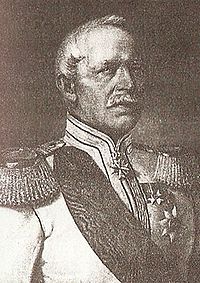Frederick William, Elector of Hesse
| Frederick William | |
|---|---|
 |
|
| Elector of Hesse | |
| Reign | 1847–1866 |
| Predecessor | William II |
| Successor | Electorate abolished |
| Born |
20 August 1802 Hanau |
| Died | 6 January 1875 (aged 72) Prague |
| Spouse | Gertrude Falkenstein, Princess of Hanau |
| House | House of Hesse |
| Father | William II |
| Mother | Princess Augusta of Prussia |
Frederick William I (20 August 1802 – 6 January 1875) was, between 1847 and 1866, the last Prince-elector of Hesse-Kassel (or Hesse-Cassel).
He was born at Hanau, the son of Prince William, later William II, Elector of Hesse, and Princess Augusta of Prussia, daughter of Frederick William II of Prussia.
During the French occupation of Hesse-Kassel (1806–1813) he stayed with his mother in Berlin. The relationship with his father was bad, because of his father's affair with Emilie Ortlöpp.
Frederick was educated at Marburg and Leipzig. He became co-regent on 30 September 1831, and Prince-elector in 1847. Under influence of his minister Hans Daniel Ludwig Friedrich Hassenpflug he conducted a reactionary policy, which made him very unpopular. He was forced to give in to the demands of the March Revolution, but reinstated Hassenpflug in 1850 after the revolution had been crushed.
In the Austro-Prussian War (1866) he chose the side of Austria. His capital Kassel was occupied by Prussia, and, as a consequence of his refusal to negotiate, he was transferred as a prisoner to Stettin on 23 June. Hessen-Kassel was annexed by Prussia in the same year.
Frederick William never accepted the Prussian dominance over his territory. Even after the creation of the unified German Empire (1871), he tried to regain his throne. He died at Prague in 1875.
Because of his morganatic marriage, his sons were excluded from succession. He was succeeded, as titular Prince-elector of Hesse, by Prince Frederick William of Hesse, from the house of Hesse-Rumpenheim.
...
Wikipedia
